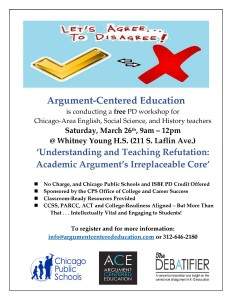
Understanding and Teaching Refutation: Academic Argument’s Irreplaceable Core — A Professional Development Workshop on Saturday, March 26th
He who knows only his own side of the case knows little of that. His reasons may be good . . . . But if he is unable to refute the reasons on the opposite side, if he does not so much as know what they are, he has no ground for preferring either opinion . . . . Nor is it enough that he should hear the opinions of adversaries from his own teachers, presented as they state them . . . . He must be able to hear them from persons who actually believe them. . . . he must know them in their most plausible and persuasive form.
— John Stuart Mill, On Liberty, 1859
Argument-Centered Education is conducting a free PD workshop for Chicago-area high school and middle school English, Social Science, and History teachers. It will take place Saturday, March 26th, 9am – 12pm, at Whitney Young Magnet H.S., 211 S. Laflin Ave. CPS and ISBE professional development credit will be provided. Registration is required.
This workshop focuses what is at once probably the most under-appreciated, under-taught, and the most essential and irreducible of all of the components of academic argument: refutation. To Argument-Centered Education, refutation should be broadly conceived, but never omitted or held off till later. Defined capaciously, refutation is anything a writer/speaker does when they differentiate their own view from that of another view. In effect, when someone is agreeing with a difference, or partially agreeing, or partially critiquing, or anything else they do other than 100% complete agreement, we understand this as “refutation.” Writers or speakers are asking that their view substitute for the other person’s view — even if their view is the other person’s view plus or minus some small correction, etc. Sometimes this is defined in an argument context as “responsiveness.” Responsiveness is closely related, and is a criterion ACE uses for effective refutation, but there is in fact too much looseness out there on counter-argument. Rigorous argumentation cannot accept any old kind of response to the other side’s arguments. We want students to understand that their response either succeeds or not in replacing or modifying another view with their own — succeeds or not in “refuting” it, as long as refutation is given its broadest possible definition.
We will explore in this workshop the ways that refutation is conducted in academic argumentation, the way that it can be effectively taught in the MS and HS literacy-based classroom. We will incorporate actual refutation activities used in English language arts, history, natural science, and social science classrooms (one for each discipline). And we will apply and distribute classroom-ready refutation resources.
Agenda
I. Argument-Centered Pedagogy and the Importance of Refutation
II. Activity 1: Using Counter-Argument and Refutation Builders, with Written and Visual Text (English Language Arts)
III. Activity 2: Tracking Arguments in Order to Enforce Critical Thinking (Natural Science)
IV. Activity 3: Conducting Classroom Debates that Incorporate Robust Refutation (History/Social Science)
V. Questions, Reflections, Wrap-Up, and Review
To register and for more information: info@argumentcenterededucation.com or 312-646-2180.


